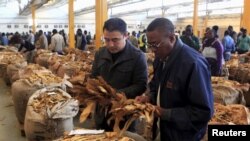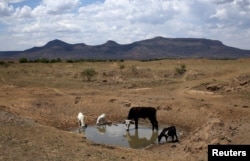The Cameroon government has asked farmers not to plant for the coming growing season until it can assure them there will be sufficient rainfall. Unpredictable weather patterns in recent years have led to long dry seasons and hurt production.
Ndukong Kennedy, 42, rears chicken in Santa on the outskirts of Bamenda, in northwest Cameroon. He abandoned his groundnut farms after late and insufficient rainfall caused the crop to wither for two consecutive years.
Rains usually start in March.
"Finally rain came by the end of April, and the sun was hot and fried the groundnut in the farm,” Kennedy explained. “We used to prepare our farm during the dry season expecting rain, knowing that on the 15th of March we have to have the first rainfall but nowadays we don't even know when the rain will come."
Henry Mumah Awah, the most senior government official in charge of environment in Bamenda, has asked farmers to not plant in 2016 until he gives the all-clear.
"There is confusion in the rainfall pattern. We call it a distorted rainfall pattern. Before, we used to know that we have a definite period for dry season and we have a definite period for rainy season, but this time around it is not very certain,” he explained. “The productivity of some of the crops are [is] dropping because of this distorted pattern of rainfall. The temperatures have gone up because deforestation has gone too high, and there is a lot of carbon dioxide shield in the atmosphere."
The African Adaptation Program of the U.N. Development Program reports that average annual temperature in Cameroon has increased a total of 0.7 degrees Celsius since the 1960's. During that same period, average annual rainfall has dropped by 2.2 percent per decade.
Environmentalist Nestor Buma blames human activity.
"More than 80 to 90 percent of the local population uses fuel wood. It pushes the local population to now fell trees, so there is abusive cut of fuel wood to use in the various households," he stated.
Depending on the region, planting would happen from mid-March to June in Cameroon. It is hard to say how many farmers would be affected by calls to delay, but 70 percent of the country's 22 million people rely on agriculture, many of them subsistence farmers.
Cameroon is not reporting any acute food shortages at the moment, but there was a 200,000 ton deficit in cereal production last year. The prices of beans, potato and maize have climbed 25 percent in the past two years according to the government, as production in some areas has stagnated.
Cameroon President Paul Biya raised concern about decreasing rainfall in his address at the start of the climate change summit that ended Saturday in Paris. Biya said Cameroon is committed to regional reforestation efforts and to reducing its carbon footprint by 32 percent by 2035.

